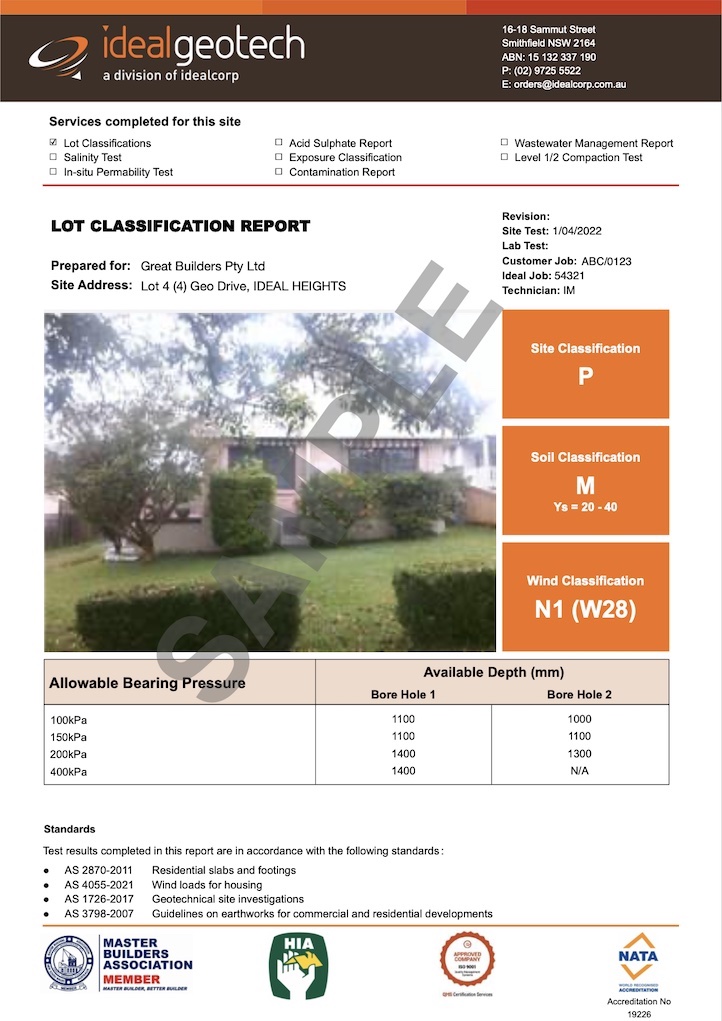Custom Lot Classification Services
Standard |
Custom |
|
|---|---|---|
| Bore hole logs: | 2 Logs | Any Qty |
| Density tests: | 2 Tests | Any Qty |
| Testing depth: | to 3m or to rock | to 6m or to rock |
| Shrink/Swell test: | Included for highly reactive soils | |
| Additional Reports: |
|
What is a Lot Classification?
A Lot Classification involves using a utility-mounted drill rig or hand auger to drill to the required depth, as per Australian Standards AS 2870-2011 and AS 1726-1993. This process provides valuable soil information, such as soil strata profiles, plasticity, presence of fill or water table, and more. It ensures your foundations are designed correctly based on site-specific conditions.
An Idealcorp Lot Classification consists of taking 2 bore logs where possible (this is to profile the soil strata) and density tests to determine the soil classification, along with a wind classification and a site classification. View sample report
What do we do on site?
- Bore hole drilling identifies:
- The subsurface soil strata (soil profiles)
- Moist or hard soils
- Determines the soil plasticity of clay
(further laboratory testing maybe required to determine soil reactivity, included) - If fill is present on your site and the depth
- If a water table is present
- If there is rock or rock floating boulders on your site
- DCPs (Dynamic Cone Penetrometer) or PP readings – to determine soil density
- Fall of site – slope measured in degrees
- Wind classification – assists in designing roof structures
- Soil classification – Determines the soil type A, S, M, H1, H2, E. – reactivity of the soil
- Site classification – considers other aspects of your site, which may classify your site as a “P” (problem)
Lot Classification FAQ’s
Why Do You Need a Lot Classification? (soil test)?
When a structural engineer is designing your home, the foundations are the most important area of the engineering. Without appropriate foundations the house is at risk of movement, cracking and potentially worse.
Not all soil is the same. Soil can be sandy, rocky or of a clay nature and many combinations of these types. Soil variation can occur over extremely short distances. They all present different challenges when a structural engineer is designing your foundations.
The soil may be prone to expansion and contraction, known as heave, common in clay soils or it may be soft and collapsing creating stability issues. It may be rocky which is great for stability but expensive if you are excavating a pool or basement.
A Lot Classification provides the engineer with knowledge to ensure they are designing the correct slab for the specific soil conditions of your property. It supplies the engineer with a soil classification, this relates to reactivity or heave in the soil, meaning how much can the soil expand and contract when wet and dry. The report supplies a site classification which relates to whether it is a P site, which alerts the engineer that there may be a problem with water, trees, soft soils and other conditions that need to be taken into account when designing the foundations.
Why Choose Ideal Geotech?
- Comprehensive Reports: Includes necessary tests like shrink/swell reactivity.
- Expert Team: Largest staff of technicians in Sydney, with in-house NATA accredited lab and geotechnical engineers.
- Convenience: Easy online ordering, quick turnaround times, and no need for on-site presence during testing.
What else do we do?
Acid Sulphate, soil infiltration, contamination, compaction, salinity and durability tests are among some of the other services we provide. If these are the tests you require, please complete an enquiry form or call us to discuss.




